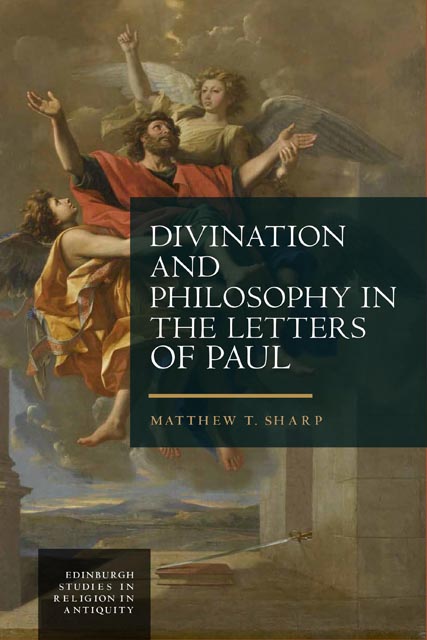Conclusion: Divination and Philosophy in Paul
Published online by Cambridge University Press: 02 June 2023
Summary
I began this study by showing how previous scholarly categories have not been able to present a full picture of Paul’s access to divine knowledge which situates him convincingly in his historical context. While Paul’s letters evince diverse means of access to divine communication, categories such as “prophecy” or “revelation” account for only portions of the evidence, and neither of those categories has been able to situate Paul’s full range of divinatory methods in the first-century culture of a Jew living in the Hellenistic Roman Empire. Under the rubric of “divination” I have analysed Paul’s various means of divine communication under the subheadings of “visions,” “speech,” “texts,” and “signs,” elucidating their role in Paul’s letters with reference to the contemporary divinatory practices of the Graeco-Roman world. I have also considered how Paul presents the mechanics of divination in conversation with contemporary philosophical reflections on the same topic.
Rather than summarise each chapter in turn, I organise my conclusions below thematically and synthetically, drawing together various strands that have emerged from the cumulative analysis of this study. Part one functions as something of a summary of Chapters 2 to 5 and focuses on the different types of knowledge each divinatory method provides. Part two considers the implications of this for how to situate the question of “revelation” in Paul’s historical context. Parts three and four take up again the question of the mechanics of divination from Chapter 1, presenting some more nuanced conclusions about divination in relation to Paul’s anthropology, cosmology, and theology that the ensuing chapters have made possible.
Methods of Divination in Paul
As ancient people turned to the gods for advice and information on a broad range of matters, so, too, Paul’s methods of divination uncover a large range of information: from smaller scale signs and revelations that direct various aspects of everyday life, to expansive insights about cosmology and eschatology. Within this range certain methods and certain types of signs lend themselves most readily to certain types of information.
Non-verbal signs are perhaps the most limited in scope as they generally only convey divine approval or disapproval.
- Type
- Chapter
- Information
- Divination and Philosophy in the Letters of Paul , pp. 197 - 204Publisher: Edinburgh University PressPrint publication year: 2023



